After her breakup, Meghan felt that strange things were happening to her on Instagram. Some of her friends were sending her indirect posts hinting at her and the breakup. Little did Meghan know about the dangers of a cyberstalker. Then one day, someone started texting her on Instagram about a few things that only Megan’s ex-boyfriend knew about her and the relationship.
This anonymous account would often share her whereabouts with her and react to her stories as soon as she shared anything. Then out of the blue, her boyfriend started appearing wherever she went – be it at the supermarket, a party, or a meeting. Confused and alarmed, Meghan started wondering if these were signs a cyberstalker likes her and how she could protect herself.
If you’re facing something along these lines or want to be aware of how to tackle such a situation, you’re in the right place. We are here to decode all you need to know about cyberstalking, in conversation with cyber security expert Dr. Kaushal Bhavsar (Ph.D. in Computer Science).
What Is A Cyberstalker?
Table of Contents
What is cyberstalking? What is a cyberstalker? Dr. Bhavsar gives us a scenario, “It has been a long day for you. You finally crushed your work goals and are on your way home. On the way, you stop for a quick bite. While making the payment, your shoulder accidentally brushes against someone. You look at them, apologize quickly, and move on.”
“But as you walk ahead, you feel someone is following you. After carefully filtering the sound of footsteps from your hearing spectrum, you are sure – someone IS following you. You turn around and take a quick look. You are on a lonely road in the middle of the night, and they get all the attention they need. You are being stalked.”
Do you think this sounds familiar? Dr. Bhavsar explains, “The chances of this being real are rare because the situation is too tricky for a stalker in the physical world. However, in the cyber world, it is quite the opposite. If you have been active over the internet, you have probably been stalked online, even if you think otherwise.” In fact, online stalking is more common than we think. The Bureau of Justice estimates that over 3.8 million Americans over 16 years have had to deal with a stalker. Today, as stalking someone online is easier than ever, let us first answer the question – who is a cyberstalker?
Dr. Bhavsar says, “Stalking someone is an attention-seeking behavior to establish communication or intimidate a specific individual. Now, what is cyberstalking? A cyberstalker uses the internet or other electronic means to harass or threaten another person repeatedly. They might send unwanted messages, watch their online activities, or spread rumors about them. Cyber harassment is a serious crime that can devastate the victim’s mental and emotional well-being.”
Related Reading: 12 Signs That You Are Dating A Stalker And Need To Break Up
9 Worrying Signs A Cyberstalker Likes You
Let me tell you the good news first. You do not have to be a tech wizard to understand if you are being cyberstalked. Sometimes, human intuition itself is enough to let you know. Besides, cyberstalkers have some set patterns that can make it easier for you to spot and flag suspicious behavior. Keeping these patterns in mind, let us decode 9 worrying signs a cyberstalker likes you:
1. Monitoring online activity
Is someone monitoring your online activity every day? Dr. Bhavsar warns, “What do stalkers want from their victims? Some stalkers develop an unhealthy fixation with their potential victim, often believing they have a special connection or are destined to be together. They may want the potential victim to give them attention, affection, or even love, regardless of the victim’s feelings.
“Cyberstalkers may follow your social media accounts, track your online interactions, and obsessively check for updates. For example, you might notice that a stranger likes, comments, or shares almost every post you make on social media platforms.” When a cyberstalker likes you, they show such signs of obsession and develop a habit of constantly tracking you online.
2. Sending unwanted messages
Cyberstalkers take to unwanted private messages like fish to water. Dr. Bhavsar says, “A cyberstalker may repeatedly send unwanted private texts, threatening emails, or chat room messages to you, even after being asked to stop. For example, you might receive daily direct messages from someone you don’t know, saying they admire you or want to see you in person for a first date after meeting online.”
3. Pretending to be you
Do you know what catfishing means? It is a method of online stalking where someone pretends to be a different person and creates a fake social media account to stalk you. There are many tips to save yourself from catfishing. Now, in some cases, a stalker may pretend to be you and send friend requests to your acquaintances. If a cyberstalker likes you, they may pose as you and send hurtful text messages to your partner and people who are romantically interested in you.
Related Reading: 13 Warning Signs Of Being Obsessed With Someone
4. Unsolicited personal information
Has someone over the internet randomly shared your own address with you? Or other personal details – the year you graduated, the occupation of your spouse, or which train you take to work? And has that left you unsettled and a little scared? Dr. Bhavsar says that this is a classic sign a cyberstalker likes you.
He explains, “A cyberstalker may send personal information about you that they have obtained through online research. This is to get a stronghold on your mind and get away with manipulation in relationships. When a person receives a message from a stranger who knows their home address, workplace, or other sensitive information about them, it is bound to leave them riled up.” This is a typical powerplay aimed at making cyberstalking victims feel vulnerable, cornered, and scared, in the hope that they will relent and give in.
5. Ordering products for you
A cyberstalker who likes you may wish to impress you or control you. To that end, they may track your online purchases and send you anonymous gifts. They may also order embarrassing items or subscribe to magazines using your credentials. These items can be delivered to your workplace if the cyberstalker wants to humiliate you. This is a clear sign you are being cyberstalked.
6. Cyberbullying and online harassment
According to the Pew Research Center, 41% of Americans have been harassed by a cyberstalker, and an even larger number (66%) have witnessed online harassment directed at other victims. Some stalkers may be motivated by a desire for vengeance or to express anger toward their target, especially if they feel wronged, rejected, or humiliated. They may be jealous, possessive and controlling. They may want to cause emotional distress or harm their target in retaliation. Cyber harassment in such cases includes:
- Defamation
- Exposing intimate pictures
- Hacking profiles
- Identity theft
- Financial loss
Dr. Bhavsar says, “A cyberstalker may engage in targeted harassment, such as posting offensive comments, spreading rumors, or even sharing explicit content to embarrass or distress you. For example, you might find out that someone has been spreading false rumors about you on a public forum, or has shared a private photo without your consent.”
7. Repeated attempts at establishing contact
Some stalkers may engage in stalking behavior out of boredom or as a form of thrill-seeking. They may enjoy the challenge of tracking and monitoring their target or the adrenaline rush from evading detection. This leads them to contact their target repeatedly.
Dr. Bhavsar says, “A cyberstalker may continually attempt to contact you and send you friend requests, even after being blocked or ignored. For example, you might block an unwanted follower on social media platforms only to find that the same person keeps creating new accounts and sending new friend requests or messages.”
Related Reading: 11 Warning Signs Of A Toxic Relationship
8. Texting through fake accounts
You know those social media accounts with two followers, blank profile photos, and a recent set-up date. Dr. Bhavsar says, “A cyberstalker may create multiple fake profiles to engage with their target or monitor their online activity without being detected. In such a case, you might receive a friend request from a profile that uses a different name and photo but seems strangely familiar, with similar interests and mutual friends.”
When a cyberstalker likes you, one of the first things that they do is create a fake account to reach out to you. These are the dangers of online dating. Your best bet at protecting yourself is not to engage with accounts that are completely anonymous or seem sketchy at first.
9. GPS tracking
Imagine you just posted a vacation selfie on Instagram with your friends. You have mentioned the location and tagged the resort where you’re staying. The next morning, someone you know shows up suddenly and greets you. You’re naturally surprised at this encounter, and you ask, “What are you doing here?” Their answer doesn’t quite add up. You know something is fishy.
The truth is, cyberstalking may often turn into physical stalking if the perpetrator likes you. You may find this person everywhere you go. They may also keep track of your location through the GPS on your smartphone. They may plant devices in your car or handbag that track your location without your knowledge.
9 Tips To Protect Yourself From A Cyberstalker
I am being cyberstalked, what can I do? How do I protect myself from cyberstalkers? I left my emotionally abusive relationship and now my ex is stalking me online. My intimate partner is harassing me online through repeated text messages. How to stay safe from cyberstalkers? How can I prevent cyberstalking? If you believe someone is stalking you online, questions like these are bound to give you sleepless nights. While it is a concerning situation to be in, you can find your way out of it. Take the following steps to protect yourself from a stalker:
1. Document everything
A Reddit user shares, “Always screenshot and document all cases of harassment. Keep this in a folder on your computer in addition to an external USB or hard drive. You can print it out as well. In addition to reporting everything that is an issue to the website’s reporting function, document that you reported the instance. This will enable you to save evidence of the issues if things escalate. For both the police and the websites that are causing issues. Websites are allowed to give away personal info if there is a warrant.”
Therefore, save any messages, emails, screenshots, or other sources of evidence that you’re being stalked online. Try to keep a record of the following:
- The dates and times when the stalker reached out to you
- How frequently they talk to you
- The location of the stalker (if you know) and your own location
- Contents of any threatening emails or descriptions of abusive behavior
- A detailed history of how the stalker has come to know you
- Any other relevant details of the stalking behavior
2. Privacy and password settings
Does a cyberstalker like you? Are you feeling unsafe due to online stalking? Dr. Bhavsar suggests, “Adjust your social media and online accounts’ privacy settings for the time being. This will limit the visibility of your posts and personal information to only trusted friends and family members.”
Apart from this, password protection is crucial. Update your passwords to prevent cyberstalking. Do not keep your last name or your pet dog’s name as your password. Use strong, unique passwords for each online account and enable two-factor authentication whenever possible. This helps protect your accounts from being hacked or accessed by unauthorized users.
3. Be cautious with personal information
Avoid sharing sensitive information like your email address, cell phone number, or workplace address online. Be mindful of the details you reveal in public forums or social media. Be wary of strangers who approach you online, especially if they seem overly interested in your personal life or if their profile appears suspicious. They may be a cyberstalker who likes you. So watch out for the reg flags. Under no circumstance should you share your personal information with such fishy accounts or strangers online.
4. Block and report
Communicate to the stalker that their behavior is unwelcome and that you want no further contact. Do this only once and avoid engaging in any other communication. After this, should you block your cyber stalker if the problem persists?
Dr. Bhavsar says, “If someone is making you uncomfortable, do not hesitate to block and report them. Most social media platforms have tools for reporting harassment or unwanted contact. Block the stalker on social media, email, and cell phone. Report any threatening or harassing behavior to the relevant platform, as well as to law enforcement.”
Related Reading: How To Get Someone To Stop Texting You Without Being Rude
5. Be aware of phishing attempts
Imagine you have been talking to a stranger who texts you all the time. One day, a carefully worded email was sent to you with the link to a popular website that you visit often. When you click on that link, it takes you to a fake website that looked exactly like that popular website. You’re instructed to update your account information or verify your account details. And guess what? In the blink of an eye, you have been robbed of every single penny in your bank account.
“Be cautious when clicking links or opening attachments in emails, especially if the sender is unknown or the message seems suspicious. Cyberstalkers may use phishing techniques to gain access to your personal information,” warns Dr. Bhavsar. Phishing is often successful because it depends on the human tendency to trust others. You may often assume the password update is legitimate. You may quickly open the link that your stalker has sent to you over text. This can cause major harm, and therefore, it is always advisable to be careful about these things.
6. Trust your instincts
As we mentioned earlier in this article, you do not need to know everything about technology to understand cyberstalking. In most cases, your instincts will tell you that you are being stalked online.
Dr. Bhavsar explains, “If something serious in your relationship feels off or you suspect someone might be stalking you online, take action to protect yourself and seek help from friends, family, or law enforcement if necessary. If you feel unsafe or believe the situation could escalate, take necessary precautions and seek help from law enforcement or other support networks.” Most importantly, believe your gut feeling that says you are unsafe and do not ignore the gravity of the situation.
Related Reading: 6 reasons why you should go with gut feel while choosing your partner
7. Inform others
Let the people in your inner circle know that someone is stalking you online. Make your loved ones aware of your safety plan. Cyberstalking can create a lot of stress and confusion, and you do not have to deal with this alone. “So if you’re comfortable, tell your friends, family members, coworkers, and neighbors about the situation. They can look out for you, offer emotional support, and help you stay safe,” Dr. Bhavsar recommends.
Johny (28), an engineer from NYC, shares with us, “I went on a few Tinder dates with a girl and I could sense something was off. She was really enthusiastic, which is great, but then it turned into intense curiosity and obsession. I told her I wasn’t interested and backed off. Suddenly, she was cyber harassing me, messaging me from multiple fake social media accounts, and trying to get information about my whereabouts. The wisest thing I did at that moment was, I shared my situation with a few close friends. They helped me take necessary action and ensure my safety.”
8. Enhance physical security
The Department of Justice reported in 2022, “A California man was arrested yesterday and will make his initial appearance in federal court today to face charges that he cyberstalked multiple young women in California in a “sextortion” campaign. Johao Miguel Chavarri, 25, aka Michael Frito, of Oceanside and Torrance, was arrested yesterday in Oceanside, where he is stationed as an active-duty member of the U.S. Marine Corps.”
“According to the criminal complaint, from 2019 through 2021, Chavarri, using the online persona “Michael Frito”, created and used numerous online accounts to repeatedly stalk, harass, and threaten women who would not give in to his demands that, among other things, they send him nude, sexually explicit, or otherwise compromising photos and videos of themselves. This type of conduct is commonly referred to as sextortion. According to the complaint, in some cases, his cyberstalking, threats, and sextortion demands continued for over a year.”
When a cyber stalker is emotionally manipulating you or disturbing you online, do not forget to establish a safety plan for your physical security as well. Be vigilant about your surroundings and change your routines to make it more difficult for the stalker to track you. Take precautions to secure your home and workplace by:
- Installing security cameras
- Not sharing your geolocation settings
- Changing locks
- Using an entrance security system
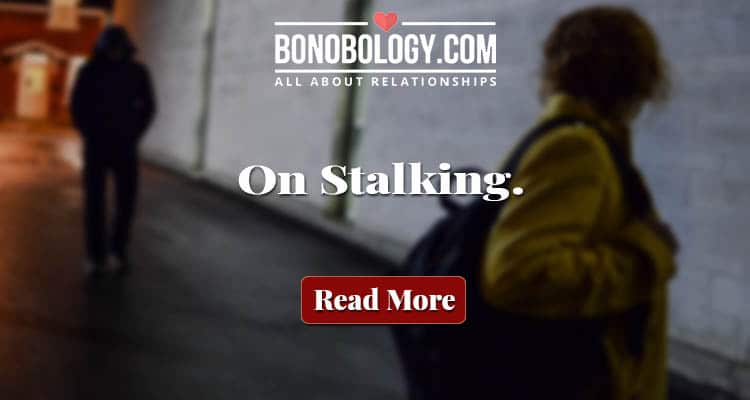
9. Consult with law enforcement
The FBI states, “Malicious cyber activity threatens the public’s safety and our national and economic security. The FBI’s cyber strategy is to impose risk and consequences on cyber adversaries. Our goal is to change the behavior of criminals and nation-states who believe they can compromise U.S. networks, steal financial and intellectual property, and put critical infrastructure at risk without facing risk themselves.”
“To do this, we use our unique mix of authorities, capabilities, and partnerships to impose consequences against our cyber adversaries. The FBI is the lead federal agency for investigating cyber attacks and intrusions. We collect and share intelligence and engage with victims while working to unmask those committing malicious cyber activities, wherever they are.”
In case of an emergency, you can call 911 or reach out to the local authorities. Remember that your safety and well-being are the top priorities, and you have the right to take necessary actions to protect yourself.
Dr. Bhavsar says, “Report cyberstalking to your local law enforcement agency, providing them with the documentation you have collected. They can advise you on the best action and help monitor the situation. Research cyberstalking laws. Moreover, in such a serious situation, consider speaking to a mental health professional or joining a support group for stalking victims. They can provide valuable guidance, support, and coping strategies.”
Key Pointers
- A cyberstalker uses the internet or other electronic means to harass or threaten another person repeatedly
- An online harasser might send unwanted messages, and multiple friend requests from fake accounts, monitor your online activities, or spread rumors about you
- Creative a strong and unique password and do not share your personal details with any stranger online
- Cyber harassment is a serious crime and you can report it to the local law enforcement agency
Starting from our latest grocery list to our most important financial details, the internet has everything nowadays. Therefore, when a cyberstalker likes you, it is natural to feel alarmed. However, you do not have to be scared or deal with this situation all alone. Talk to a therapist and let your friends know what you’re going through. Make your social media accounts as safe as possible and contact local authorities if necessary. You deserve a safe online experience and a peaceful night’s rest. Therefore, do not hesitate to take the necessary steps to ensure your safety.
FAQs
The motivations of stalkers can vary greatly depending on the individual. Most stalkers may seek to control their targets, feeling a sense of power by invading their privacy and manipulating their lives. This can stem from feelings of insecurity, low self-esteem, or past experiences of being controlled themselves. Stalkers may also feel lonely, isolated, or lack meaningful relationships. Stalking can provide them with a sense of connection or emotional engagement, albeit in a highly inappropriate and harmful way.
Some stalkers may suffer from mental health disorders that contribute to their stalking behavior, such as delusional disorders, personality disorders, or other conditions that affect their ability to form healthy relationships or perceive reality accurately. In other cases, stalkers may indulge in this serious crime to get revenge on the target or a sense of thrill from stalking.
If you want to know how to get rid of a cyberstalker, look after your online as well as personal safety. Keep strong and unique passwords for your social media accounts to ensure password protection. Make sure your bank information is also secure. Inform the people in your support system about your situation and make sure they are also alert. Most social media platforms have tools for reporting harassment or unwanted contact. Block the stalker on social media, email, and phone. Apart from this, report cyberstalking to the relevant platform, as well as to your local authorities.
8 Signs Of Covert Narcissist Hoovering And How You Should Respond
Social Media And Relationships: Have We Isolated Ourselves To Find Company?
Your contribution does not constitute a charitable donation. It will allow Bonobology to continue bringing you new and up-to-date information in our pursuit of helping anyone in the world to learn how to do anything.

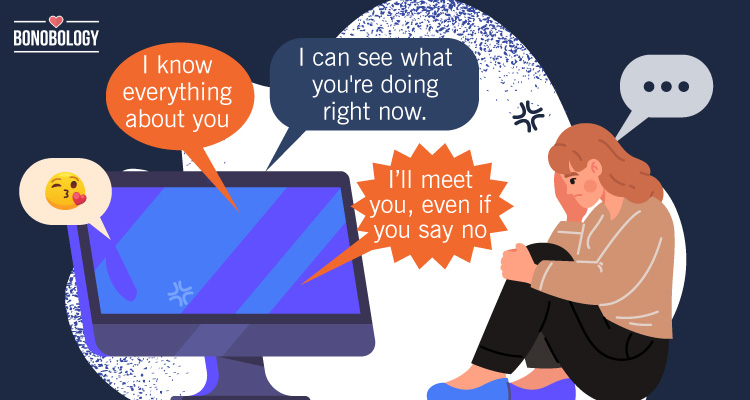


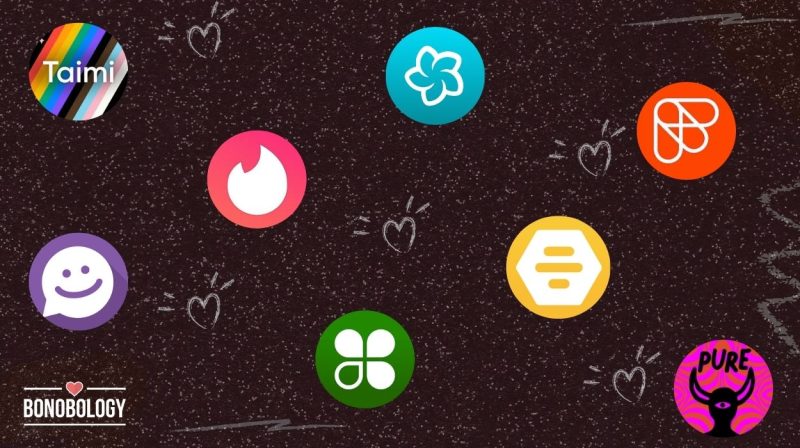



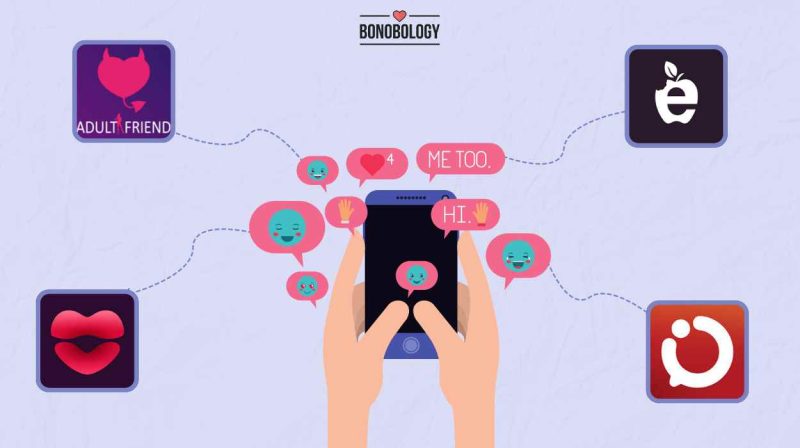


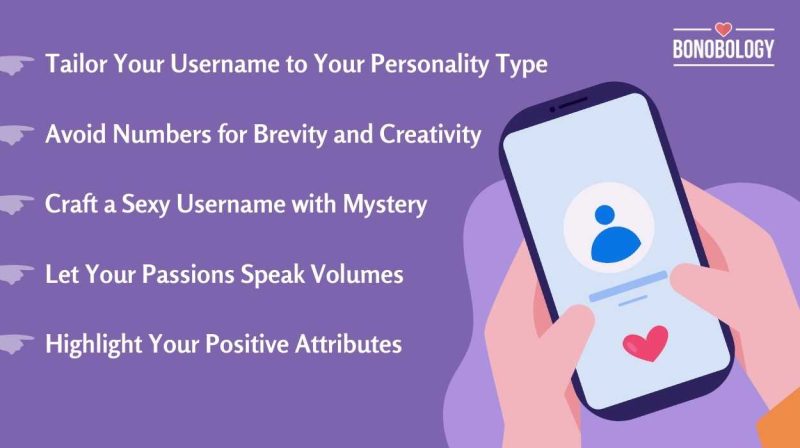




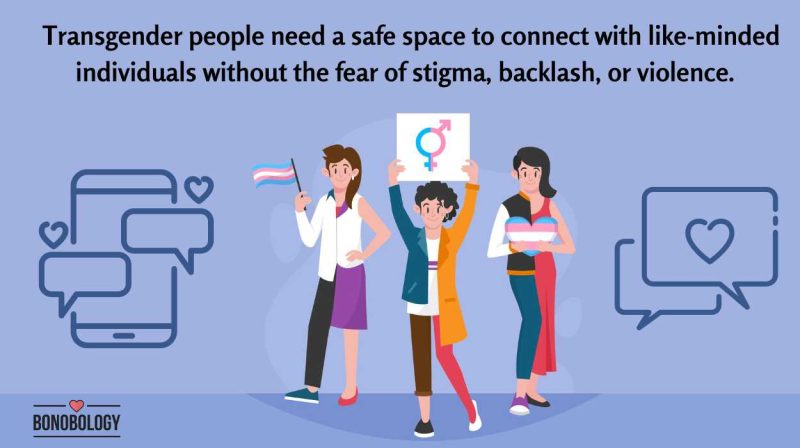


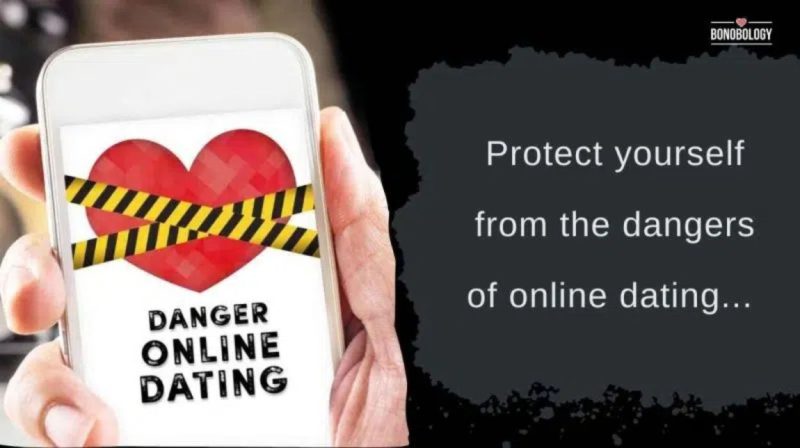



Featured
13 Best Anime Dating Sites And Apps For Otaku Singles In 2025
21 Best Hookup Apps For Those Looking To Get Laid
How To Text A Girl For The First Time: 15 Tips And 75 Examples
15 International Dating Sites — Broaden Your Search For Love
15 Real Mature Female Dating Profile Examples
15 Best Dating Apps For Cheating | 2025
❤️ Meaning From A Girl—5 Interpretations And How To Respond
Looking For The Perfect Headline For Dating Site? 200+ Ideas
200+ Ideas For A Username For Dating Site — Set Yourself Apart
10 Actionable Steps To Increase Tinder Matches
13 Genuine Tips To Help You Slide Into Someone’s DMs
65 Best Instagram Pickup Lines To Start A Conversation
How To Find A Millionaire To Date: 10 Ways To Attract A Millionaire Man
9 Best Trans Dating Apps And Sites: Top Expert Picks
50 Incredible Responses To The “Dating Me Is Like” Hinge Prompt
100 Best Hinge Conversation Starters To Get You To The Talking Stage
11 Best Background Check Sites for Dating in 2025
69 Flirty Dares Over Text To Spice Things Up
The Art Of Online Dating: Navigating The World Of Apps And Websites
15 Best Free Dating Sites For Serious Relationships | 2023